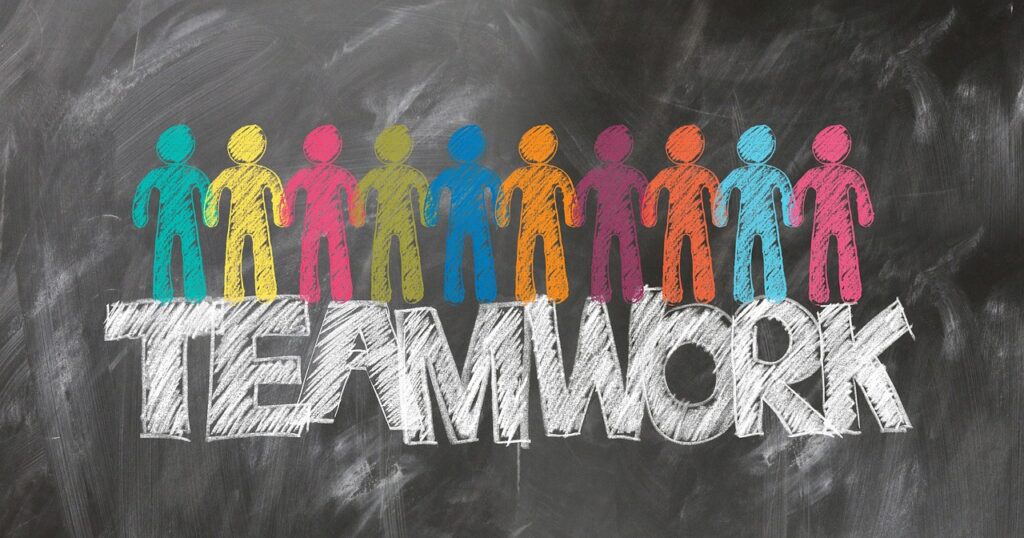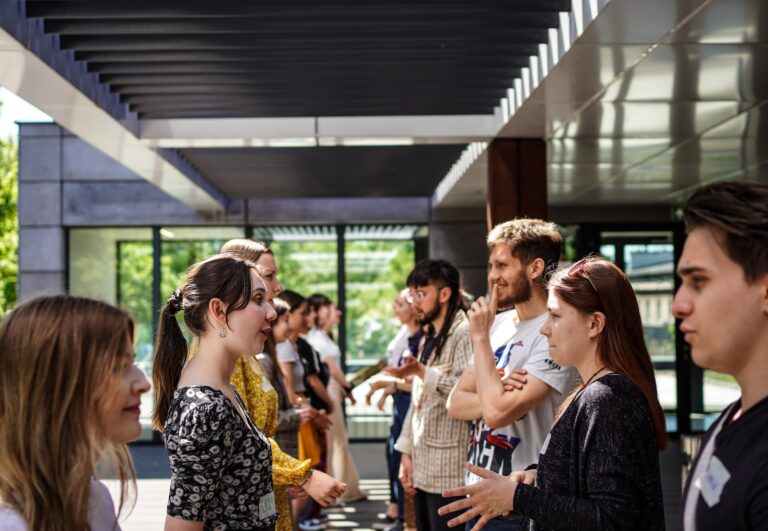Unleashing the Power of Teamwork: Achieving Extraordinary Results Together
Harnessing the Collective Potential: The Impact of Teamwork
In a world where individual achievements often take center stage, it is easy to overlook the immense power and potential that lie within the collective efforts of a team. When a group of people work effectively toward a shared goal, their combined impact far exceeds what any individual could achieve on their own. Teams, whether they are comprised of athletes, students, co-workers, neighbors, or political allies, have the remarkable ability to unite individuals and, through collaboration, unlock new challenges and opportunities that would otherwise remain out of reach.
The benefits of teamwork extend far beyond the mere sum of its parts. When individuals come together as a team, they bring with them a diverse range of traits, experiences, and competencies that contribute to the overall strength and effectiveness of the group. Each team member possesses unique perspectives and ideas, allowing for a rich tapestry of thought and creativity to emerge. It is through this collective synergy that teams are able to amplify individual strengths and transcend the limitations of any single person.
Moreover, collaboration within a team fosters the development and expansion of our interpersonal skills. As team members collaborate and engage with one another, they build meaningful connections and relationships. They weather life’s ups and downs together, learning from shared losses and celebrating shared wins. These shared experiences not only deepen bonds but also cultivate empathy, understanding, and trust among team members. By navigating challenges as a unified front, teams nurture a sense of camaraderie that becomes the bedrock of their success.
In today’s fast-paced and interconnected world, the importance of effective teamwork cannot be overstated. Organizations and communities rely on teams to tackle complex problems, drive innovation, and effect positive change. However, the success of a team hinges on the presence of skilled leaders who understand the dynamics of collaboration and are capable of fostering an environment conducive to collective achievement.
Leadership plays a vital role in empowering teams to reach their full potential. Effective leaders create a shared vision and goals that inspire and motivate team members. They facilitate open and inclusive communication, ensuring that everyone’s voice is heard and valued. By empowering individuals within the team, leaders encourage autonomy and ownership, allowing each member to contribute their unique skills and perspectives. Additionally, leaders provide ongoing support and guidance, ensuring that teams have the necessary resources and direction to overcome obstacles and achieve their shared objectives.
However, teamwork is not without its challenges. Managing conflicts and differences of opinion, navigating individual egos, and aligning diverse perspectives can be demanding. Building trust and fostering psychological safety within a team are crucial to overcome these hurdles and ensure effective collaboration.
Throughout this article, we will explore the power of teamwork and collaboration, delving into case studies from various domains where teams have achieved remarkable outcomes. We will analyze the strategies and skills necessary for building and sustaining effective teams, as well as the pivotal role of leadership in harnessing the collective potential of individuals. By understanding the intricacies of teamwork and implementing proven techniques, we can unlock the full potential of teams and create a world where collective achievements transcend individual limitations. Join us as we embark on a journey to uncover the transformative impact of collaboration and explore the timeless art of effective leadership in team settings.
The Benefits of Teamwork
Amplification of Individual Strengths
One of the greatest advantages of teamwork lies in its ability to amplify the strengths of each individual team member. When individuals join forces and collaborate, they bring a diverse set of skills, knowledge, and expertise to the table. Each person possesses unique talents and perspectives that, when combined, create a powerful synergy that surpasses what any one person could achieve alone.
Consider a sports team, for instance. In a basketball team, one player may excel in shooting, while another player may possess exceptional ball-handling skills. When they work together, their individual strengths complement each other, resulting in a more formidable offense. By leveraging their respective abilities, the team can achieve a higher level of performance than any individual player could achieve on their own.
Similarly, in a professional setting, teamwork allows individuals with different skill sets to collaborate and contribute their expertise. A software development team, for example, may consist of programmers, designers, and quality assurance specialists. By pooling their skills, the team can develop comprehensive and robust software solutions that integrate both technical functionality and user-centered design. The collective intelligence of the team enhances the quality of the final product, exceeding what any single individual could have accomplished independently.
Diverse Perspectives and Ideas
Another significant benefit of teamwork is the exposure to diverse perspectives and ideas. When individuals from different backgrounds, experiences, and cultures come together, they bring a wealth of insights and approaches to problem-solving. This diversity of thought fosters creativity and innovation, enabling teams to find novel solutions to complex challenges.
In a team, each member sees the world through their unique lens, influenced by their individual experiences and expertise. These diverse perspectives lead to a broader understanding of issues at hand, allowing teams to analyze problems from multiple angles. By embracing and respecting these differences, teams can tap into a rich pool of ideas and viewpoints, sparking creativity and driving innovation.
For example, in a marketing team, members with diverse backgrounds may bring varied perspectives on how to reach and engage different target audiences. By combining their insights, the team can develop comprehensive marketing campaigns that resonate with a wider range of customers. The diversity of thought within the team ensures that blind spots are minimized and a more comprehensive approach is taken, resulting in more effective strategies.
Enhanced Problem-Solving Capabilities
Teams have a distinct advantage when it comes to problem-solving. By pooling the collective knowledge and expertise of its members, a team can tackle complex challenges with greater efficiency and effectiveness. When faced with difficult decisions or intricate problems, teams can engage in collaborative brainstorming, analysis, and evaluation, drawing upon the diverse skills and perspectives of its members.
In a team setting, problems are approached from multiple angles, allowing for a more comprehensive assessment of the situation. Team members can share their insights, offer different approaches, and challenge assumptions, leading to a more robust and well-rounded problem-solving process. This collaborative effort minimizes blind spots and increases the likelihood of finding innovative solutions.
Moreover, teamwork enables teams to distribute the workload and leverage the collective capacity of its members. When individuals collaborate, tasks can be delegated based on individual strengths and expertise, resulting in a more efficient allocation of resources. As a result, teams can tackle complex projects and challenges with greater speed and effectiveness, ultimately achieving better outcomes.
Increased Creativity and Innovation
Teams are fertile grounds for creativity and innovation. The synergy that emerges when individuals with diverse backgrounds and perspectives collaborate fosters an environment that encourages out-of-the-box thinking and the exploration of new ideas.
When team members engage in open and inclusive discussions, ideas can flow freely, sparking creative insights and novel approaches. The process of bouncing ideas off one another and building upon each other’s suggestions stimulates innovative thinking and leads to breakthroughs. In fact, research has shown that diverse teams consistently outperform homogeneous teams in terms of creativity and innovation. The combination of different viewpoints, experiences, and expertise leads to a broader range of ideas and perspectives being considered.
By embracing a culture of collaboration and creating a safe space for sharing and exploring ideas, teams can unlock their collective creative potential. Encouraging team members to think outside the box and challenge conventional wisdom allows for the generation of fresh ideas and unique solutions to complex problems.
Moreover, teamwork provides a platform for experimentation and learning from failures. When team members feel supported and encouraged to take risks, they are more likely to explore unconventional approaches and push the boundaries of what is possible. Even if an idea doesn’t work out as expected, the lessons learned can contribute to future breakthroughs and innovation.
Teams that prioritize creativity and innovation also foster a sense of excitement and engagement among team members. The collaborative and dynamic nature of the team environment encourages individuals to bring their best ideas forward, contributing to a vibrant and innovative team culture.
Teamwork provides the ideal environment for increased creativity and innovation. By bringing together diverse perspectives, encouraging open discussions, and promoting a supportive atmosphere, teams can tap into the collective creativity of their members. The ability to think outside the box and explore new possibilities leads to innovative solutions and sets teams apart in their ability to tackle complex challenges and drive meaningful change.
Developing Interpersonal Skills through Collaboration
Building Meaningful Connections
One of the remarkable benefits of teamwork is the opportunity to build meaningful connections with fellow team members. Collaboration brings individuals together, fostering relationships based on trust, respect, and shared experiences. Through working together toward a common goal, team members develop a sense of camaraderie and solidarity.
Building these connections goes beyond the professional realm. Team members often share personal stories, aspirations, and challenges, creating a sense of belonging and support. This sense of community not only enhances the team’s dynamics but also contributes to the overall well-being and job satisfaction of its members. By fostering a positive and supportive team culture, individuals feel valued, understood, and motivated to contribute their best efforts.
Learning from Shared Experiences
Teamwork provides a unique opportunity for learning and growth through shared experiences. As team members navigate challenges, celebrate successes, and face setbacks together, they learn valuable lessons that shape their personal and professional development.
Shared experiences expose individuals to diverse perspectives, alternative problem-solving approaches, and different ways of thinking. Through active participation in team discussions, individuals expand their knowledge base, refine their skills, and gain insights from the expertise of others. This continuous learning cycle promotes individual growth and contributes to the overall effectiveness of the team.
Moreover, shared experiences teach individuals important lessons about collaboration, communication, and teamwork. They learn how to navigate conflicts, resolve disagreements, and work through differences in opinion. These experiences build resilience, adaptability, and emotional intelligence, essential skills that can be transferred to other aspects of life.
Developing Empathy and Understanding
Teamwork fosters the development of empathy and understanding among team members. As individuals collaborate, they gain insights into each other’s perspectives, experiences, and challenges. This exposure cultivates empathy, enabling team members to understand and appreciate the unique circumstances and motivations of their colleagues.
By actively listening and seeking to understand one another, team members foster an environment of psychological safety and mutual support. This empathetic understanding enhances communication, strengthens relationships, and promotes effective collaboration. It also helps to break down barriers, foster inclusivity, and create a sense of unity within the team.
Empathy and understanding are particularly crucial in diverse teams, where individuals from different backgrounds come together. By embracing and valuing diversity, teams can harness the richness of varied perspectives and experiences. This inclusive approach not only leads to better decision-making but also promotes a culture of respect and acceptance.
Strengthening Communication and Conflict Resolution Skills
Effective teamwork hinges on strong communication and conflict resolution skills. Collaborative environments provide ample opportunities for individuals to hone these essential interpersonal competencies.
Within a team, effective communication is vital for sharing ideas, exchanging information, and coordinating efforts. Through regular interactions and discussions, team members learn to express their thoughts clearly, actively listen to others, and provide constructive feedback. They develop the ability to communicate their needs, expectations, and concerns, fostering an open and transparent team culture.
Furthermore, teamwork presents opportunities to practice conflict resolution. Diverse perspectives and competing interests can occasionally lead to disagreements or misunderstandings. However, teams that prioritize open and constructive dialogue can transform conflicts into opportunities for growth. By developing conflict resolution skills, team members can address differences with empathy, actively seek resolutions, and maintain strong relationships.
Strengthening communication and conflict resolution skills within a team not only improves collaboration but also translates to other areas of life. These skills are transferable to personal relationships, professional settings, and leadership roles, enabling individuals to navigate challenges with greater ease and effectiveness.
Teamwork provides a fertile ground for developing essential interpersonal skills. Building meaningful connections, learning from shared experiences, developing empathy and understanding, and strengthening communication and conflict resolution skills are just a few of the valuable outcomes of collaborative efforts. These interpersonal competencies not only enhance the effectiveness of teams but also contribute to the personal growth and well-being of its members. By recognizing and cultivating the power of teamwork, individuals can unlock their collective potential and achieve extraordinary results.
The Role of Leadership in Fostering Effective Teams
Creating a Shared Vision and Goals
Leadership plays a pivotal role in fostering effective teams by providing a clear and compelling vision for the team’s purpose and goals. A shared vision aligns team members, giving them a sense of direction and a common purpose to work towards. It ignites motivation and inspires individuals to contribute their best efforts to the team’s collective success.
An effective leader communicates the vision in a way that resonates with each team member, highlighting the significance of their contributions and how they fit into the bigger picture. By articulating the purpose and goals of the team, leaders create a sense of meaning and significance, which fosters engagement and commitment among team members.
Facilitating Effective Communication and Collaboration
Leadership plays a critical role in facilitating effective communication and collaboration within teams. Open and transparent communication channels enable team members to exchange ideas, share information, and provide feedback. A leader creates an environment where everyone’s voice is heard, ensuring that diverse perspectives are valued and considered.
Moreover, leaders encourage a collaborative culture by promoting active listening and fostering an atmosphere of respect and trust. They facilitate discussions that encourage constructive dialogue, where differing opinions can be shared and debated without fear of judgment. By creating a safe space for collaboration, leaders stimulate the exchange of ideas, encourage innovation, and enhance problem-solving capabilities within the team.
Empowering Team Members
Effective leaders empower team members by providing them with autonomy, trust, and the necessary resources to succeed. They recognize and leverage the unique skills and strengths of each individual, allowing them to take ownership of their work and contribute to the team’s success.
Empowerment involves delegating responsibilities and granting decision-making authority to team members. This not only fosters a sense of ownership but also enables individuals to develop their skills and take on leadership roles within the team. When team members feel empowered, they are more engaged, motivated, and committed to achieving shared goals.
Providing Support and Guidance
Leadership is not only about setting direction and empowering team members; it also involves providing support and guidance throughout the team’s journey. Effective leaders serve as mentors and coaches, offering guidance, feedback, and encouragement to individual team members.
By understanding the unique needs and aspirations of each team member, leaders can provide tailored support and development opportunities. They recognize and appreciate the strengths of individuals, while also identifying areas for growth. Leaders foster a culture of continuous learning and improvement, providing resources and training to enhance the skills and capabilities of team members.
In addition, leaders play a crucial role in removing obstacles and providing solutions when challenges arise. They act as a bridge between the team and organizational stakeholders, ensuring that the necessary support, resources, and recognition are provided to facilitate the team’s success. Leaders also demonstrate resilience and perseverance, serving as role models during times of adversity and inspiring team members to overcome obstacles.
By effectively fulfilling these leadership roles, leaders create an environment where effective teamwork can thrive. They establish the foundation for collaboration, empower team members, and provide the necessary support and guidance for success. Through their leadership, teams can reach their full potential and achieve remarkable outcomes.
Leadership is a key ingredient in fostering effective teams. Leaders play a vital role in creating a shared vision, facilitating communication and collaboration, empowering team members, and providing support and guidance. Effective leadership cultivates an environment where individuals can come together, leverage their collective strengths, and achieve extraordinary results as a unified team.
Overcoming Challenges in Teamwork
Managing Conflicts and Differences
One of the challenges teams often face is managing conflicts and differences that arise within the group. Diverse perspectives and individual preferences can lead to disagreements, tensions, and potential breakdowns in communication. However, successful teams understand that conflicts are natural and can be opportunities for growth and innovation.
Leadership plays a crucial role in helping teams navigate conflicts effectively. A skilled leader encourages open and respectful communication, creating a safe space for team members to express their viewpoints and concerns. They facilitate constructive dialogue and mediate conflicts, ensuring that discussions remain focused on finding solutions rather than escalating into personal disputes.
Moreover, leaders promote a culture of active listening and empathy, encouraging team members to understand and appreciate differing perspectives. By fostering a sense of psychological safety, leaders enable individuals to voice their concerns without fear of judgment or reprisal. Through effective conflict management, teams can harness the diversity within the group and use it as a catalyst for creativity and problem-solving.
Dealing with Individual Egos
Individual egos can pose a significant challenge to effective teamwork. When team members become overly focused on personal recognition and status, collaboration and cooperation may suffer. Ego-driven behaviors such as self-promotion, resistance to feedback, and a lack of willingness to compromise can hinder the team’s progress and cohesion.
Leadership plays a critical role in addressing and managing individual egos within a team. They foster a culture of humility and shared success, emphasizing the importance of collective achievement over individual accolades. By setting clear expectations and modeling cooperative behaviors, leaders encourage team members to prioritize the team’s goals and work collaboratively towards them.
Additionally, leaders provide feedback and recognition that focus on the team’s accomplishments rather than individual contributions alone. They create an environment where each team member feels valued and appreciated for their unique contributions, reducing the need for excessive ego-driven behaviors.
Addressing Coordination and Alignment Issues
In complex projects or larger teams, coordination and alignment can become challenging. Without effective coordination, team members may duplicate efforts, miss deadlines, or work at cross-purposes. Lack of alignment on goals, roles, and responsibilities can lead to confusion and decreased productivity.
Leadership plays a vital role in addressing coordination and alignment issues. They establish clear roles and responsibilities, ensuring that each team member understands their specific contributions to the team’s objectives. Through effective delegation and task assignment, leaders distribute workload evenly, minimizing redundancies and ensuring that all necessary tasks are addressed.
Moreover, leaders facilitate regular communication and progress updates, ensuring that team members are aligned with the overall project goals and informed about the progress of other team members. They encourage transparency and collaboration, enabling team members to share information, coordinate efforts, and identify potential bottlenecks or gaps in the workflow.
Building Trust and Fostering Psychological Safety
Trust is a fundamental element of successful teamwork. Without trust, collaboration and effective communication become challenging, inhibiting the team’s ability to achieve its goals. Similarly, without psychological safety, team members may hesitate to take risks, share ideas, or admit mistakes, limiting the team’s potential for innovation and growth.
Leadership plays a central role in building trust and fostering psychological safety within a team. They lead by example, demonstrating integrity, reliability, and accountability in their own actions. By being transparent and authentic, leaders create an environment where trust can flourish.
Furthermore, leaders encourage open communication and actively seek input from team members, valuing their perspectives and ideas. They create opportunities for team members to share their thoughts without fear of judgment or retribution. By creating a psychologically safe environment, leaders empower individuals to take risks, be vulnerable, and learn from both successes and failures.
Teams encounter various challenges in their pursuit of effective collaboration. However, with skilled leadership, these challenges can be addressed and overcome. By managing conflicts, addressing individual egos, ensuring coordination and alignment, and fostering trust and psychological safety, leaders create the conditions necessary for teams to thrive and reach their full potential.
Case Studies of Successful Teamwork
Sports Teams Achieving Remarkable Victories
Sports teams provide compelling examples of the power of teamwork. From legendary basketball teams like the Chicago Bulls of the 1990s to the dominant soccer teams like FC Barcelona, these teams have achieved remarkable success through effective collaboration and synergy.
In basketball, the Chicago Bulls, led by Michael Jordan, showcased the power of teamwork in winning six NBA championships. Each player understood their role within the team and leveraged their individual strengths to complement one another. The collective effort of the team, combined with the strategic guidance of the coaching staff, resulted in a seamless and harmonious playing style that dominated the league.
Similarly, FC Barcelona’s soccer team under the leadership of Pep Guardiola demonstrated exceptional teamwork. Known for their “tiki-taka” style of play, Barcelona utilized quick passing, movement, and positional play to overwhelm their opponents. The team’s success was built on a deep understanding of each player’s role, precise coordination, and the ability to anticipate and support one another’s actions on the field.
Business Teams Driving Innovation and Growth
Effective teamwork is also crucial in the business world, where teams drive innovation, solve complex problems, and propel organizations forward. Companies like Google and Pixar Animation Studios have become synonymous with collaborative and creative team environments.
At Google, the company’s success can be attributed in large part to their cross-functional and highly collaborative teams. Through the creation of interdisciplinary teams comprising engineers, designers, and product managers, Google fosters an environment where diverse perspectives and expertise intersect. This collaborative approach has led to groundbreaking innovations such as Google Search, Gmail, and Google Maps.
Pixar Animation Studios is another notable example of the power of teamwork in driving creativity and success. The studio’s unique collaborative culture, where directors, writers, animators, and technicians work closely together, has produced critically acclaimed and commercially successful animated films. By fostering an environment that encourages open communication, trust, and constructive feedback, Pixar has consistently delivered groundbreaking storytelling and visual excellence.
Community Organizations Creating Positive Change
Teamwork extends beyond sports and business to community organizations that strive to create positive change. Non-profit organizations and volunteer groups harness the power of collaboration to address social issues, support communities, and make a lasting impact.
For instance, Habitat for Humanity, an international non-profit organization, brings together teams of volunteers, donors, and community members to build affordable housing for those in need. By leveraging the skills and resources of individuals from various backgrounds, Habitat for Humanity creates a collective effort that goes beyond what any single person could accomplish. The teamwork and collaboration within the organization are instrumental in providing safe and sustainable housing solutions to communities worldwide.
Political Alliances Achieving Common Objectives
Political alliances demonstrate the power of teamwork in achieving common objectives within the realm of governance and policymaking. Whether at the local, national, or international level, collaborations between political parties, interest groups, and grassroots movements can drive significant change.
The Civil Rights Movement in the United States serves as a notable example of effective teamwork in the pursuit of social justice. Leaders like Martin Luther King Jr. rallied diverse groups and individuals around a shared vision of equality, inspiring collective action. Through strategic planning, nonviolent protests, and collaboration among civil rights organizations, the movement successfully challenged discriminatory laws and advanced the cause of civil rights for African Americans.
Similarly, international alliances such as the Paris Agreement on climate change demonstrate the impact of collaboration on a global scale. By bringing together countries, organizations, and stakeholders, this treaty aims to combat climate change through collective action. The agreement highlights the importance of teamwork and cooperation in addressing complex and pressing global challenges.
Numerous case studies across sports, business, community organizations, and political alliances highlight the transformative impact of effective teamwork. These examples demonstrate that by leveraging the collective strengths, diverse perspectives, and collaborative efforts of team members, extraordinary achievements can be realized. Through teamwork, individuals can reach heights they could not have reached alone, achieving remarkable victories, driving innovation, creating positive change, and achieving common objectives.
Strategies for Building and Sustaining Effective Teams
Establishing Clear Roles and Responsibilities
One of the key strategies for building and sustaining effective teams is the establishment of clear roles and responsibilities for each team member. When team members understand their specific contributions and how their roles align with the team’s goals, it enhances clarity, accountability, and collaboration.
Leaders should ensure that roles and responsibilities are communicated effectively, emphasizing the importance of each team member’s contributions to the overall success of the team. This clarity prevents duplication of efforts, minimizes confusion, and fosters a sense of ownership and purpose among team members.
Regularly revisiting and clarifying roles and responsibilities is essential as team dynamics evolve over time. As projects progress or new members join the team, it is important to reassess and realign roles to adapt to changing circumstances. This flexibility ensures that team members are equipped to fulfill their responsibilities effectively and contribute to the team’s overall objectives.
Promoting Open and Inclusive Communication
Open and inclusive communication is a fundamental aspect of effective teamwork. It enables team members to share ideas, exchange feedback, and address concerns in a supportive and respectful environment. Effective leaders create a culture that values and encourages open communication, where everyone’s voice is heard and respected.
To promote open communication, leaders should foster an atmosphere of psychological safety, where team members feel comfortable expressing their thoughts and opinions without fear of judgment or retribution. They should actively listen to team members, encouraging diverse viewpoints and fostering a sense of belonging and trust.
Furthermore, leveraging communication tools and technologies can enhance collaboration, particularly in geographically dispersed teams. Platforms for video conferencing, instant messaging, and collaborative document sharing facilitate seamless communication and enable team members to connect and collaborate effectively, regardless of physical distance.
Encouraging Collaboration and Idea-Sharing
Collaboration lies at the heart of effective teamwork. By encouraging collaboration, leaders harness the collective intelligence and diverse perspectives within the team, leading to more innovative and comprehensive solutions.
Leaders can foster collaboration by creating opportunities for team members to work together on projects or tasks, promoting cross-functional collaboration and knowledge sharing. They should establish platforms or processes that facilitate the exchange of ideas, such as brainstorming sessions, team meetings, or virtual collaboration spaces. By encouraging active participation and soliciting input from all team members, leaders ensure that diverse perspectives are considered and valuable ideas are surfaced.
In addition, leaders should recognize and reward collaborative efforts within the team. Celebrating team achievements rather than individual accomplishments fosters a culture that values teamwork and encourages ongoing collaboration. By acknowledging and appreciating the collaborative contributions of team members, leaders reinforce the importance of working together towards shared goals.
Providing Ongoing Training and Development
Investing in the training and development of team members is crucial for building and sustaining effective teams. Continuous learning and skill development not only enhance individual capabilities but also contribute to the overall effectiveness of the team.
Leaders should identify the specific skills and knowledge areas that would benefit team members in their roles. They can then provide opportunities for training, workshops, seminars, or professional development programs to enhance these skills. By investing in the growth of team members, leaders demonstrate a commitment to their success and create a culture of continuous improvement.
Furthermore, leaders should encourage peer-to-peer learning and knowledge sharing within the team. Creating spaces for team members to share best practices, lessons learned, and success stories enables the team to leverage the collective wisdom and experiences of its members. This collaborative learning environment fosters a sense of camaraderie and promotes the growth and development of all team members.
Strategies for building and sustaining effective teams involve establishing clear roles and responsibilities, promoting open and inclusive communication, encouraging collaboration and idea-sharing, and providing ongoing training and development opportunities. These strategies create a foundation for strong team dynamics, foster a culture of continuous learning and improvement, and maximize the collective potential of the team. By implementing these strategies, leaders can cultivate high-performing teams that achieve exceptional results.
Uniting Strengths, Inspiring Change: The Enduring Legacy of Effective Teams
Power of Teamwork and Collaboration
Throughout this article, we have explored the profound impact of teamwork and collaboration. By joining forces, individuals can surpass their individual potential and achieve remarkable outcomes that would be impossible to accomplish alone. We have seen how teamwork amplifies individual strengths, harnesses diverse perspectives, enhances problem-solving capabilities, and fosters creativity and innovation. Moreover, collaboration within teams cultivates essential interpersonal skills, including building meaningful connections, learning from shared experiences, developing empathy and understanding, and strengthening communication and conflict resolution abilities.
Importance of Cultivating Effective Teams in Various Domains
The significance of effective teamwork spans across various domains. In sports, teams come together to achieve victories, relying on coordination, trust, and collaboration to outperform their opponents. In the business world, teams drive innovation, solve complex problems, and propel organizations forward. Community organizations harness the power of teamwork to create positive change and support those in need. And political alliances unite to achieve common objectives and bring about societal transformation. In each context, effective teams make a lasting impact and achieve results that extend far beyond what individuals could accomplish on their own.
Enduring Impact of Collective Efforts
As we conclude our exploration of the power of teamwork, it is essential to recognize that effective teams are not formed overnight. Building and sustaining successful teams require intentional effort, strong leadership, and a commitment to continuous improvement. By establishing clear roles and responsibilities, promoting open communication, encouraging collaboration, and providing ongoing training and development, leaders can cultivate teams that thrive and achieve exceptional results.
In a world that often celebrates individual achievements, it is crucial to remember that the collective potential and impact of a team far exceed the reach of any individual. By fostering an environment where collaboration, respect, and trust flourish, leaders enable teams to unleash their full potential. Together, teams can tackle complex challenges, drive innovation, effect positive change, and leave a lasting legacy.
In embracing the power of teamwork, we embrace the strength of unity and the beauty of diverse perspectives coming together for a common purpose. Let us continue to nurture and celebrate effective teamwork, recognizing its transformative power in shaping a better future for individuals, organizations, and society as a whole. Through teamwork, we can accomplish extraordinary feats and create a world where collective achievements transcend individual limitations.






